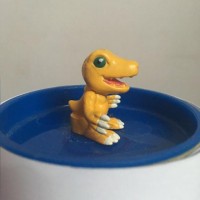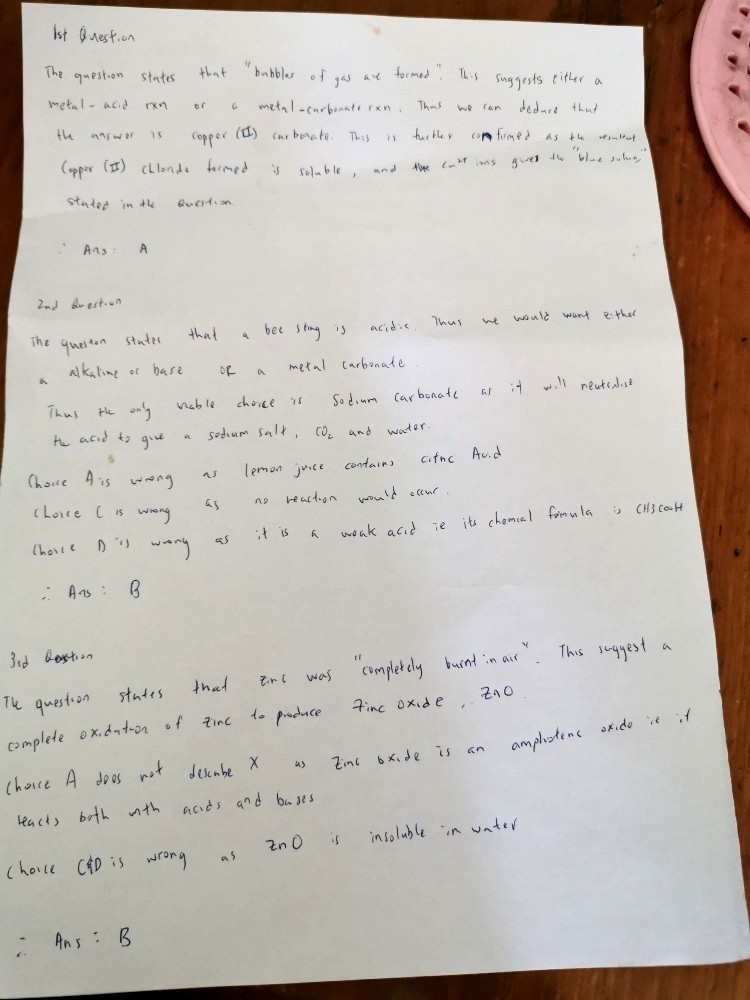Ask Singapore Homework?
Upload a photo of a Singapore homework and someone will email you the solution for free.

See 2 Answers
The answer can be derived from elimination if you are unsure about the chemical properties of sodium carbonate.
Lemon juice is acidic, as it contains citric acid (X)
Vinegar is also acidic (I forgot what acidic compound it contains, but its mildly acidic)
(X)
Sodium Chloride (table salt, not acidic or basic in nature) (X)
Thus the answer is sodium carbonate, which gives an alkaline solution when dissolved in water. (acids and bases neutralize each other to form salt and water)
Lemon juice is acidic, as it contains citric acid (X)
Vinegar is also acidic (I forgot what acidic compound it contains, but its mildly acidic)
(X)
Sodium Chloride (table salt, not acidic or basic in nature) (X)
Thus the answer is sodium carbonate, which gives an alkaline solution when dissolved in water. (acids and bases neutralize each other to form salt and water)
Vinegar has acetic acid, more commonly known as ethanoic acid.
Carbonate is technically a base also, but it gives off carbon dioxide (as its name suggests).
Carbonate is technically a base also, but it gives off carbon dioxide (as its name suggests).
Ah yes, acetic acid!
Mixing table salt and vinegar produces HCl in relatively small quantities, great for cleaning hehehe.
Metallic Carbonates reacting with acids produces CO2 on top of salt and water :)
Though to neutralize a bee sting i think solutions are more effective.
Mixing table salt and vinegar produces HCl in relatively small quantities, great for cleaning hehehe.
Metallic Carbonates reacting with acids produces CO2 on top of salt and water :)
Though to neutralize a bee sting i think solutions are more effective.
Actually sodium carbonate is soluble in water since all (or at least the majority of) group I compounds are quite soluble in water.
I presume sodium carbonate comes as an aqueous solution.
I presume sodium carbonate comes as an aqueous solution.
It does come powdered as well!
Most commonly available carbonate of sodium is baking soda! (Sodium bicarb)
Majority of carbonates are insoluble in water at RTP, with exceptions including (but not limited to) Lithium, Sodium, Potassium, Ammonium carbonates
Most commonly available carbonate of sodium is baking soda! (Sodium bicarb)
Majority of carbonates are insoluble in water at RTP, with exceptions including (but not limited to) Lithium, Sodium, Potassium, Ammonium carbonates
The proper term would be sparingly soluble
Most common household sources of sodium carbonate would be washing soda, detergents, soap, cleaners and bleach.
Safest is soap, just lather with water. Otherwise a bit of washing soda with water, dab/lightly rub on the skin
Most common household sources of sodium carbonate would be washing soda, detergents, soap, cleaners and bleach.
Safest is soap, just lather with water. Otherwise a bit of washing soda with water, dab/lightly rub on the skin
Yep sparingly soluble is the technically correct term when handling questions with regards to solubility product.
However, we would be unable to say sparingly soluble when carring out lab experiments with say, barium sulfate as it would be exceedingly difficult to detect the trace amount (Barium sulfate ksp is around the ballpark of 1.1M X10^-10 mol²) without specialised equipment.
Thus, in a lab context, saying that barium sulfate or other sparingly soluble compounds are "insoluble" in a particular solvent isn't incorrect, as these are observations and not results.
However, we would be unable to say sparingly soluble when carring out lab experiments with say, barium sulfate as it would be exceedingly difficult to detect the trace amount (Barium sulfate ksp is around the ballpark of 1.1M X10^-10 mol²) without specialised equipment.
Thus, in a lab context, saying that barium sulfate or other sparingly soluble compounds are "insoluble" in a particular solvent isn't incorrect, as these are observations and not results.
Yup it can be considered as 'insoluble', it isn't incorrect as you mentioned in terms of writing lab observations.
But I'm addressing the theoretical context here since it's a written question rather than a practical test/exam question posted.
A lot of students have the misconception that the term 'insoluble' is 100% insoluble.
For O levels, insoluble is still acceptable. When the student goes up to A level, polytechnic and university, sparingly soluble would be the term to be used.
Not sure about the syllabus now, but back in my time , 'insoluble' would be marked down if used during A levels.
But I'm addressing the theoretical context here since it's a written question rather than a practical test/exam question posted.
A lot of students have the misconception that the term 'insoluble' is 100% insoluble.
For O levels, insoluble is still acceptable. When the student goes up to A level, polytechnic and university, sparingly soluble would be the term to be used.
Not sure about the syllabus now, but back in my time , 'insoluble' would be marked down if used during A levels.
Can't comment on that since I've never had to take the A Level Chemistry, Physics or Math exams.
As they progress with the syllabus, new concepts will be introduced. Everyone who thinks insoluble is 100% insoluble, should have any preconceived notions overturned after introduction to solubility products and solubility constants. Unless of course KSP and QSP aren't part of A level syllabus (Fairly certain that they are)
As they progress with the syllabus, new concepts will be introduced. Everyone who thinks insoluble is 100% insoluble, should have any preconceived notions overturned after introduction to solubility products and solubility constants. Unless of course KSP and QSP aren't part of A level syllabus (Fairly certain that they are)
Oh I see. I'm guessing you took IB or were from NUSHS?
done
{{ upvoteCount }} Upvotes
clear
{{ downvoteCount * -1 }} Downvotes
Ajaj
Date Posted:
4 years ago







